Political Leadership and Political Elite: Concepts and Theories Report
VerifiedAdded on 2021/07/09
|8
|2885
|206
Report
AI Summary
This report delves into the multifaceted realm of political leadership and the political elite, commencing with a foundational definition of leadership and its historical significance. It explores the process of political leader formation, examining the diverse factors influencing their development, from family and education to media and political systems. The report then categorizes various types of leaders, including traditional, rational-legal, and charismatic leaders, alongside modern classifications such as flag bearers and firefighters. Furthermore, it elucidates the concept of the political elite, outlining its characteristics, functions, and the dynamics of elite circulation. The report emphasizes the importance of understanding these concepts for a comprehensive grasp of political science and power structures within societies.
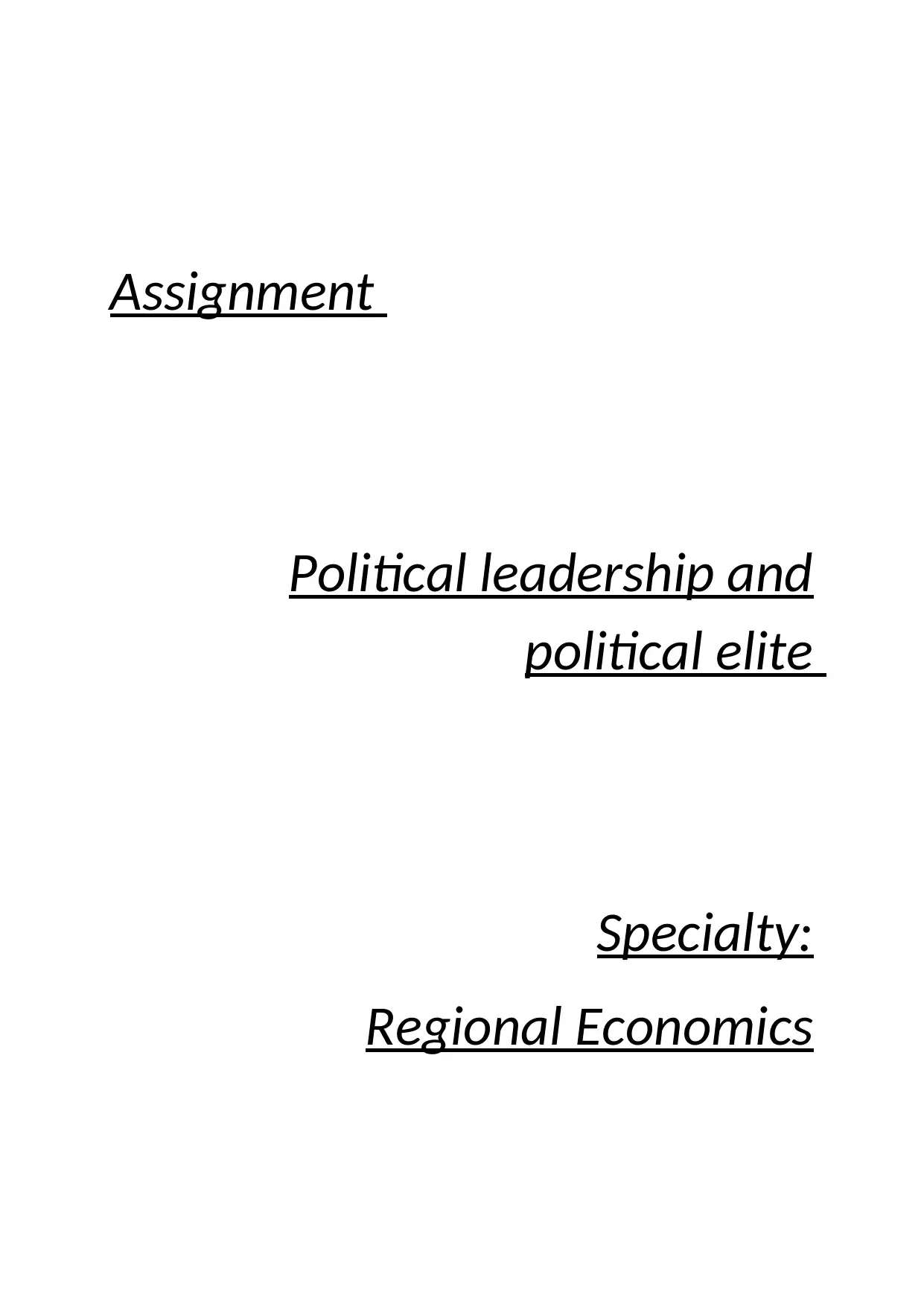
Assignment
Political leadership and
political elite
Specialty:
Regional Economics
Political leadership and
political elite
Specialty:
Regional Economics
Paraphrase This Document
Need a fresh take? Get an instant paraphrase of this document with our AI Paraphraser
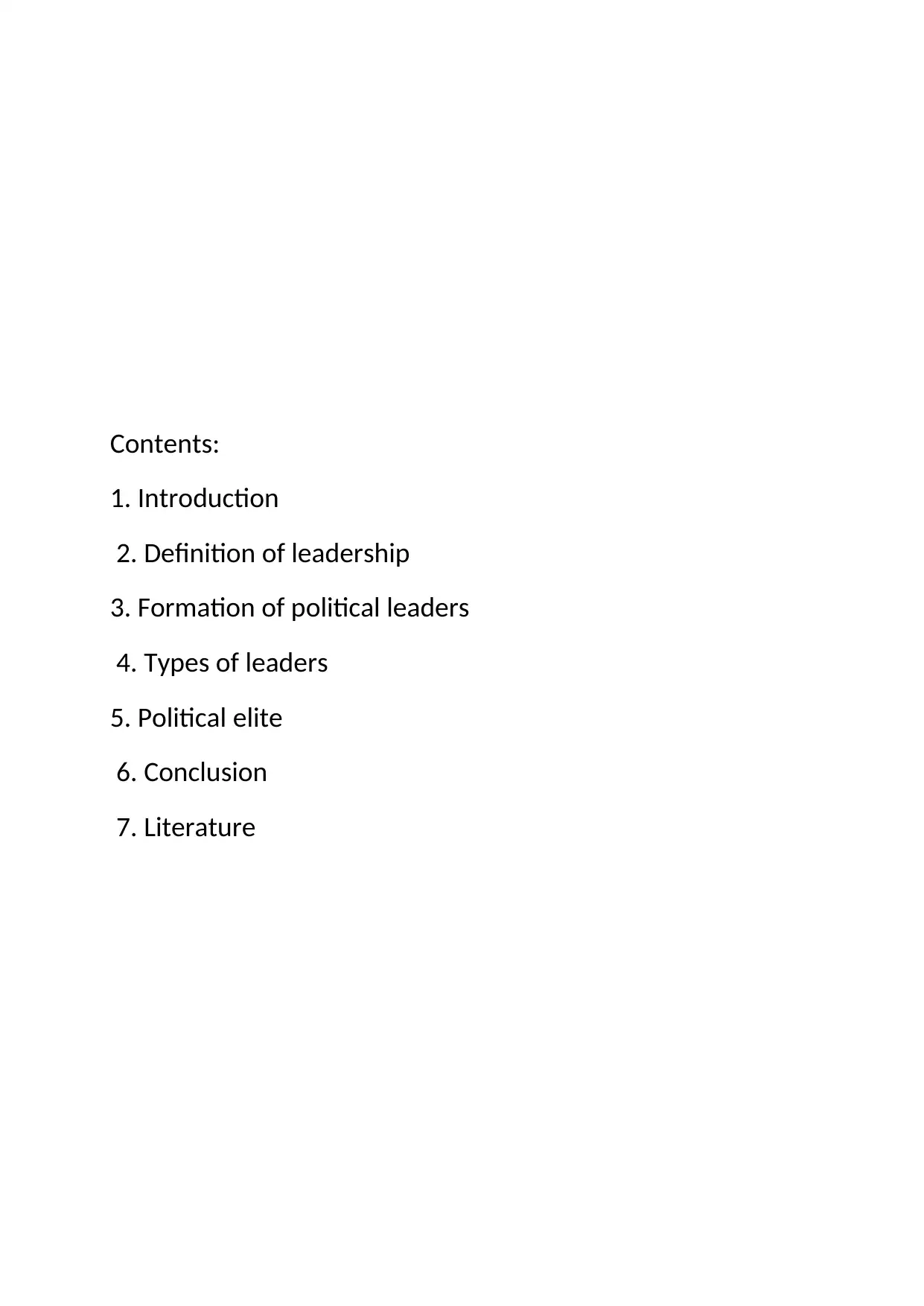
Contents:
1. Introduction
2. Definition of leadership
3. Formation of political leaders
4. Types of leaders
5. Political elite
6. Conclusion
7. Literature
1. Introduction
2. Definition of leadership
3. Formation of political leaders
4. Types of leaders
5. Political elite
6. Conclusion
7. Literature
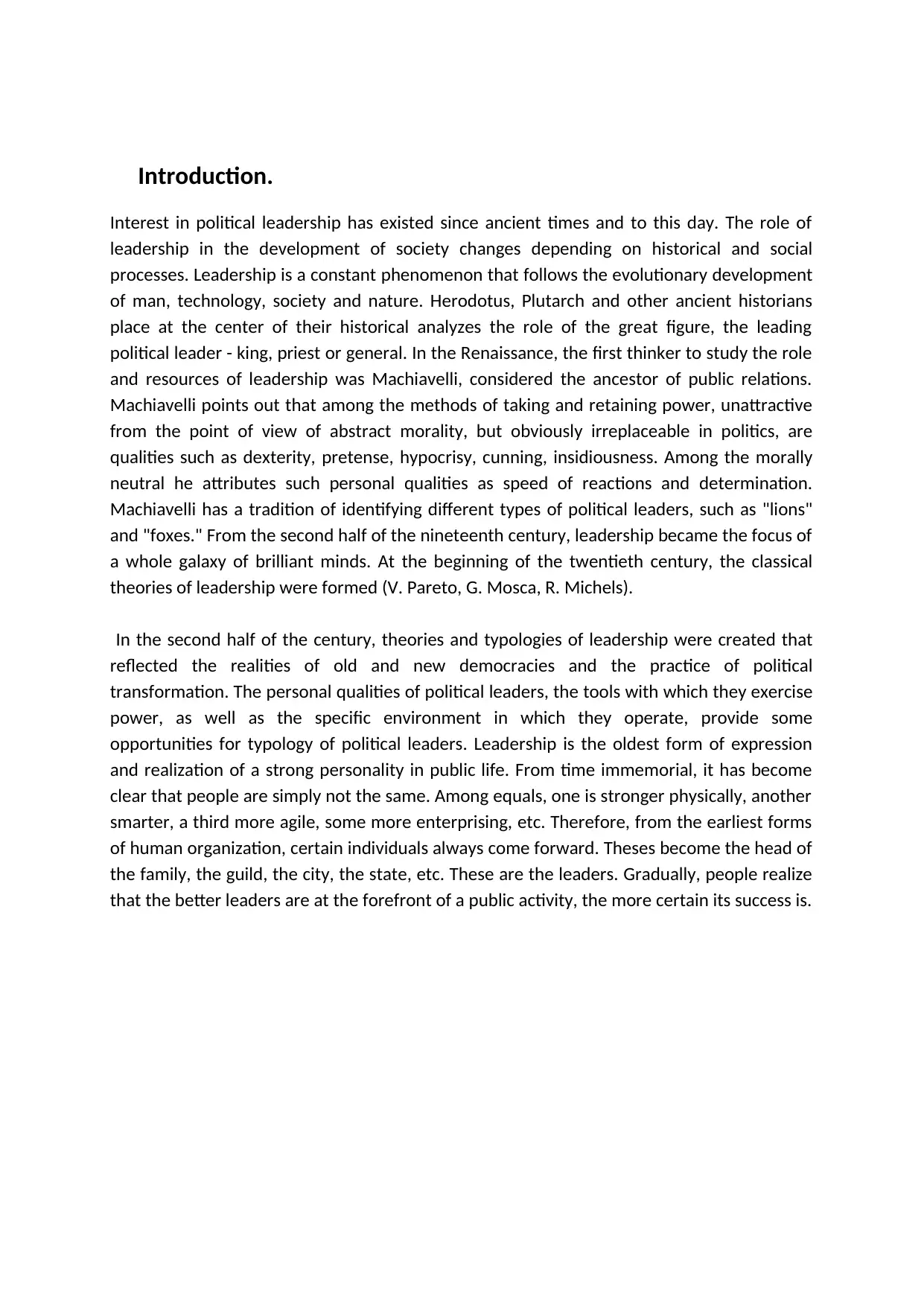
Introduction.
Interest in political leadership has existed since ancient times and to this day. The role of
leadership in the development of society changes depending on historical and social
processes. Leadership is a constant phenomenon that follows the evolutionary development
of man, technology, society and nature. Herodotus, Plutarch and other ancient historians
place at the center of their historical analyzes the role of the great figure, the leading
political leader - king, priest or general. In the Renaissance, the first thinker to study the role
and resources of leadership was Machiavelli, considered the ancestor of public relations.
Machiavelli points out that among the methods of taking and retaining power, unattractive
from the point of view of abstract morality, but obviously irreplaceable in politics, are
qualities such as dexterity, pretense, hypocrisy, cunning, insidiousness. Among the morally
neutral he attributes such personal qualities as speed of reactions and determination.
Machiavelli has a tradition of identifying different types of political leaders, such as "lions"
and "foxes." From the second half of the nineteenth century, leadership became the focus of
a whole galaxy of brilliant minds. At the beginning of the twentieth century, the classical
theories of leadership were formed (V. Pareto, G. Mosca, R. Michels).
In the second half of the century, theories and typologies of leadership were created that
reflected the realities of old and new democracies and the practice of political
transformation. The personal qualities of political leaders, the tools with which they exercise
power, as well as the specific environment in which they operate, provide some
opportunities for typology of political leaders. Leadership is the oldest form of expression
and realization of a strong personality in public life. From time immemorial, it has become
clear that people are simply not the same. Among equals, one is stronger physically, another
smarter, a third more agile, some more enterprising, etc. Therefore, from the earliest forms
of human organization, certain individuals always come forward. Theses become the head of
the family, the guild, the city, the state, etc. These are the leaders. Gradually, people realize
that the better leaders are at the forefront of a public activity, the more certain its success is.
Interest in political leadership has existed since ancient times and to this day. The role of
leadership in the development of society changes depending on historical and social
processes. Leadership is a constant phenomenon that follows the evolutionary development
of man, technology, society and nature. Herodotus, Plutarch and other ancient historians
place at the center of their historical analyzes the role of the great figure, the leading
political leader - king, priest or general. In the Renaissance, the first thinker to study the role
and resources of leadership was Machiavelli, considered the ancestor of public relations.
Machiavelli points out that among the methods of taking and retaining power, unattractive
from the point of view of abstract morality, but obviously irreplaceable in politics, are
qualities such as dexterity, pretense, hypocrisy, cunning, insidiousness. Among the morally
neutral he attributes such personal qualities as speed of reactions and determination.
Machiavelli has a tradition of identifying different types of political leaders, such as "lions"
and "foxes." From the second half of the nineteenth century, leadership became the focus of
a whole galaxy of brilliant minds. At the beginning of the twentieth century, the classical
theories of leadership were formed (V. Pareto, G. Mosca, R. Michels).
In the second half of the century, theories and typologies of leadership were created that
reflected the realities of old and new democracies and the practice of political
transformation. The personal qualities of political leaders, the tools with which they exercise
power, as well as the specific environment in which they operate, provide some
opportunities for typology of political leaders. Leadership is the oldest form of expression
and realization of a strong personality in public life. From time immemorial, it has become
clear that people are simply not the same. Among equals, one is stronger physically, another
smarter, a third more agile, some more enterprising, etc. Therefore, from the earliest forms
of human organization, certain individuals always come forward. Theses become the head of
the family, the guild, the city, the state, etc. These are the leaders. Gradually, people realize
that the better leaders are at the forefront of a public activity, the more certain its success is.
⊘ This is a preview!⊘
Do you want full access?
Subscribe today to unlock all pages.

Trusted by 1+ million students worldwide
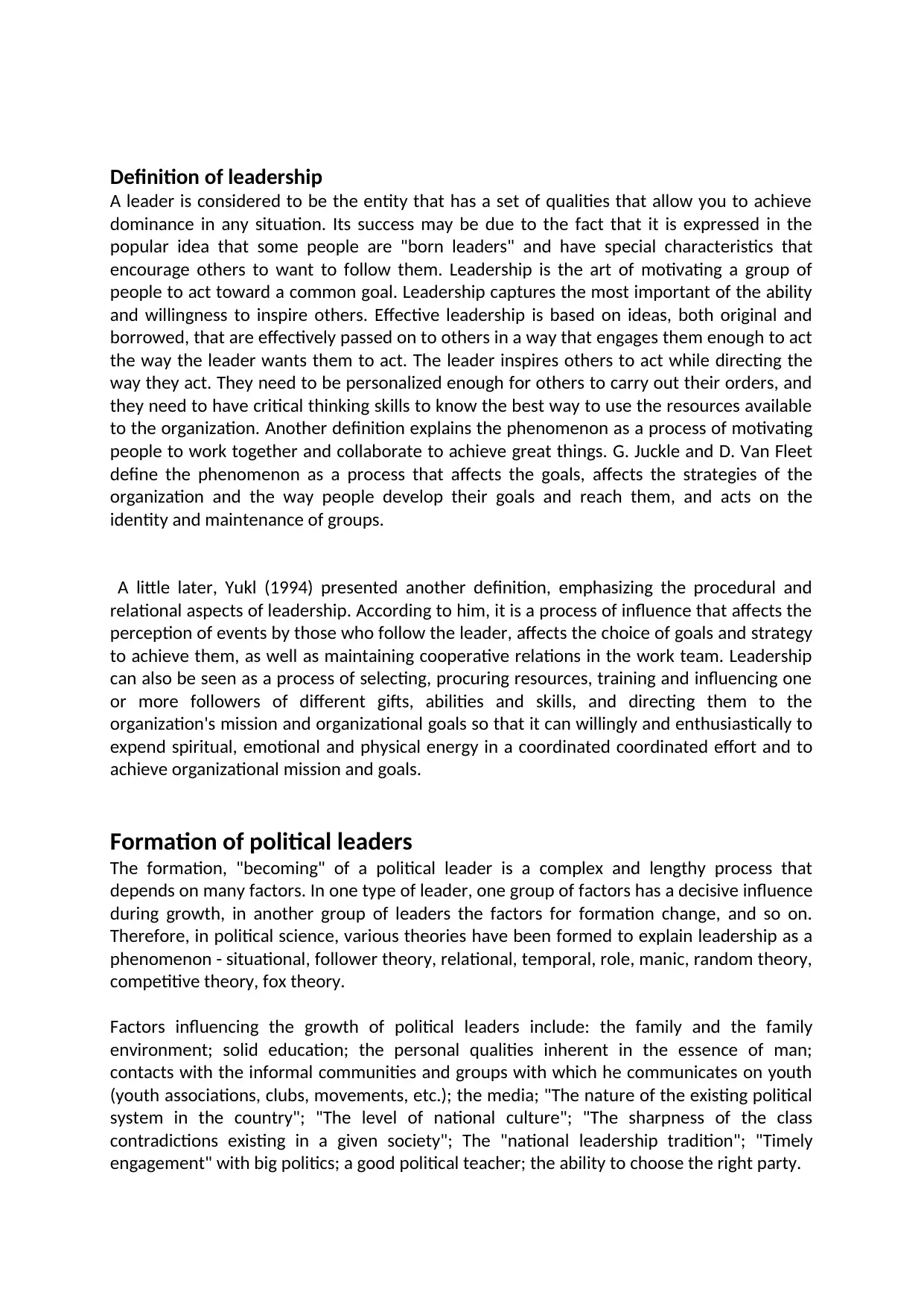
Definition of leadership
A leader is considered to be the entity that has a set of qualities that allow you to achieve
dominance in any situation. Its success may be due to the fact that it is expressed in the
popular idea that some people are "born leaders" and have special characteristics that
encourage others to want to follow them. Leadership is the art of motivating a group of
people to act toward a common goal. Leadership captures the most important of the ability
and willingness to inspire others. Effective leadership is based on ideas, both original and
borrowed, that are effectively passed on to others in a way that engages them enough to act
the way the leader wants them to act. The leader inspires others to act while directing the
way they act. They need to be personalized enough for others to carry out their orders, and
they need to have critical thinking skills to know the best way to use the resources available
to the organization. Another definition explains the phenomenon as a process of motivating
people to work together and collaborate to achieve great things. G. Juckle and D. Van Fleet
define the phenomenon as a process that affects the goals, affects the strategies of the
organization and the way people develop their goals and reach them, and acts on the
identity and maintenance of groups.
A little later, Yukl (1994) presented another definition, emphasizing the procedural and
relational aspects of leadership. According to him, it is a process of influence that affects the
perception of events by those who follow the leader, affects the choice of goals and strategy
to achieve them, as well as maintaining cooperative relations in the work team. Leadership
can also be seen as a process of selecting, procuring resources, training and influencing one
or more followers of different gifts, abilities and skills, and directing them to the
organization's mission and organizational goals so that it can willingly and enthusiastically to
expend spiritual, emotional and physical energy in a coordinated coordinated effort and to
achieve organizational mission and goals.
Formation of political leaders
The formation, "becoming" of a political leader is a complex and lengthy process that
depends on many factors. In one type of leader, one group of factors has a decisive influence
during growth, in another group of leaders the factors for formation change, and so on.
Therefore, in political science, various theories have been formed to explain leadership as a
phenomenon - situational, follower theory, relational, temporal, role, manic, random theory,
competitive theory, fox theory.
Factors influencing the growth of political leaders include: the family and the family
environment; solid education; the personal qualities inherent in the essence of man;
contacts with the informal communities and groups with which he communicates on youth
(youth associations, clubs, movements, etc.); the media; "The nature of the existing political
system in the country"; "The level of national culture"; "The sharpness of the class
contradictions existing in a given society"; The "national leadership tradition"; "Timely
engagement" with big politics; a good political teacher; the ability to choose the right party.
A leader is considered to be the entity that has a set of qualities that allow you to achieve
dominance in any situation. Its success may be due to the fact that it is expressed in the
popular idea that some people are "born leaders" and have special characteristics that
encourage others to want to follow them. Leadership is the art of motivating a group of
people to act toward a common goal. Leadership captures the most important of the ability
and willingness to inspire others. Effective leadership is based on ideas, both original and
borrowed, that are effectively passed on to others in a way that engages them enough to act
the way the leader wants them to act. The leader inspires others to act while directing the
way they act. They need to be personalized enough for others to carry out their orders, and
they need to have critical thinking skills to know the best way to use the resources available
to the organization. Another definition explains the phenomenon as a process of motivating
people to work together and collaborate to achieve great things. G. Juckle and D. Van Fleet
define the phenomenon as a process that affects the goals, affects the strategies of the
organization and the way people develop their goals and reach them, and acts on the
identity and maintenance of groups.
A little later, Yukl (1994) presented another definition, emphasizing the procedural and
relational aspects of leadership. According to him, it is a process of influence that affects the
perception of events by those who follow the leader, affects the choice of goals and strategy
to achieve them, as well as maintaining cooperative relations in the work team. Leadership
can also be seen as a process of selecting, procuring resources, training and influencing one
or more followers of different gifts, abilities and skills, and directing them to the
organization's mission and organizational goals so that it can willingly and enthusiastically to
expend spiritual, emotional and physical energy in a coordinated coordinated effort and to
achieve organizational mission and goals.
Formation of political leaders
The formation, "becoming" of a political leader is a complex and lengthy process that
depends on many factors. In one type of leader, one group of factors has a decisive influence
during growth, in another group of leaders the factors for formation change, and so on.
Therefore, in political science, various theories have been formed to explain leadership as a
phenomenon - situational, follower theory, relational, temporal, role, manic, random theory,
competitive theory, fox theory.
Factors influencing the growth of political leaders include: the family and the family
environment; solid education; the personal qualities inherent in the essence of man;
contacts with the informal communities and groups with which he communicates on youth
(youth associations, clubs, movements, etc.); the media; "The nature of the existing political
system in the country"; "The level of national culture"; "The sharpness of the class
contradictions existing in a given society"; The "national leadership tradition"; "Timely
engagement" with big politics; a good political teacher; the ability to choose the right party.
Paraphrase This Document
Need a fresh take? Get an instant paraphrase of this document with our AI Paraphraser
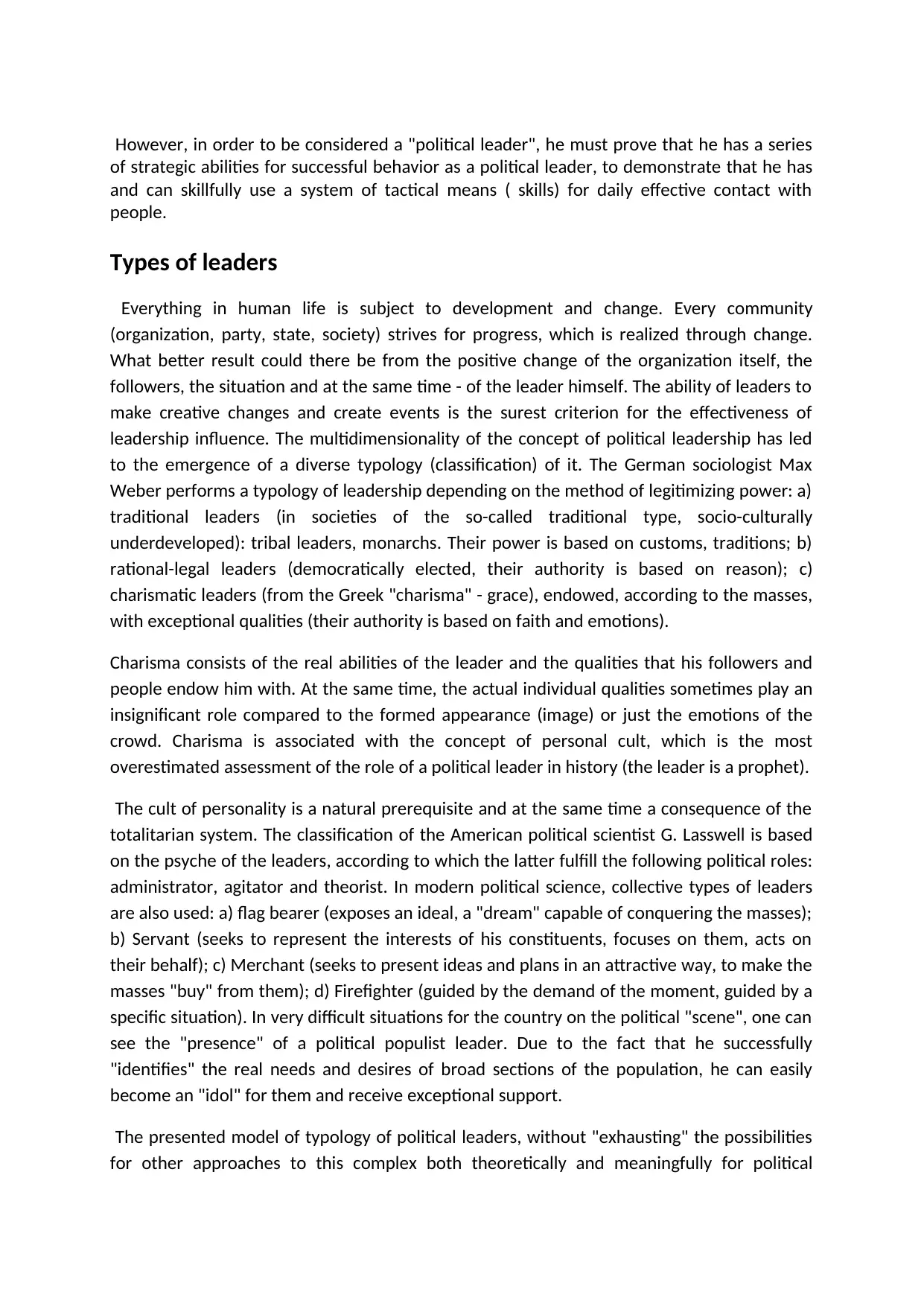
However, in order to be considered a "political leader", he must prove that he has a series
of strategic abilities for successful behavior as a political leader, to demonstrate that he has
and can skillfully use a system of tactical means ( skills) for daily effective contact with
people.
Types of leaders
Everything in human life is subject to development and change. Every community
(organization, party, state, society) strives for progress, which is realized through change.
What better result could there be from the positive change of the organization itself, the
followers, the situation and at the same time - of the leader himself. The ability of leaders to
make creative changes and create events is the surest criterion for the effectiveness of
leadership influence. The multidimensionality of the concept of political leadership has led
to the emergence of a diverse typology (classification) of it. The German sociologist Max
Weber performs a typology of leadership depending on the method of legitimizing power: a)
traditional leaders (in societies of the so-called traditional type, socio-culturally
underdeveloped): tribal leaders, monarchs. Their power is based on customs, traditions; b)
rational-legal leaders (democratically elected, their authority is based on reason); c)
charismatic leaders (from the Greek "charisma" - grace), endowed, according to the masses,
with exceptional qualities (their authority is based on faith and emotions).
Charisma consists of the real abilities of the leader and the qualities that his followers and
people endow him with. At the same time, the actual individual qualities sometimes play an
insignificant role compared to the formed appearance (image) or just the emotions of the
crowd. Charisma is associated with the concept of personal cult, which is the most
overestimated assessment of the role of a political leader in history (the leader is a prophet).
The cult of personality is a natural prerequisite and at the same time a consequence of the
totalitarian system. The classification of the American political scientist G. Lasswell is based
on the psyche of the leaders, according to which the latter fulfill the following political roles:
administrator, agitator and theorist. In modern political science, collective types of leaders
are also used: a) flag bearer (exposes an ideal, a "dream" capable of conquering the masses);
b) Servant (seeks to represent the interests of his constituents, focuses on them, acts on
their behalf); c) Merchant (seeks to present ideas and plans in an attractive way, to make the
masses "buy" from them); d) Firefighter (guided by the demand of the moment, guided by a
specific situation). In very difficult situations for the country on the political "scene", one can
see the "presence" of a political populist leader. Due to the fact that he successfully
"identifies" the real needs and desires of broad sections of the population, he can easily
become an "idol" for them and receive exceptional support.
The presented model of typology of political leaders, without "exhausting" the possibilities
for other approaches to this complex both theoretically and meaningfully for political
of strategic abilities for successful behavior as a political leader, to demonstrate that he has
and can skillfully use a system of tactical means ( skills) for daily effective contact with
people.
Types of leaders
Everything in human life is subject to development and change. Every community
(organization, party, state, society) strives for progress, which is realized through change.
What better result could there be from the positive change of the organization itself, the
followers, the situation and at the same time - of the leader himself. The ability of leaders to
make creative changes and create events is the surest criterion for the effectiveness of
leadership influence. The multidimensionality of the concept of political leadership has led
to the emergence of a diverse typology (classification) of it. The German sociologist Max
Weber performs a typology of leadership depending on the method of legitimizing power: a)
traditional leaders (in societies of the so-called traditional type, socio-culturally
underdeveloped): tribal leaders, monarchs. Their power is based on customs, traditions; b)
rational-legal leaders (democratically elected, their authority is based on reason); c)
charismatic leaders (from the Greek "charisma" - grace), endowed, according to the masses,
with exceptional qualities (their authority is based on faith and emotions).
Charisma consists of the real abilities of the leader and the qualities that his followers and
people endow him with. At the same time, the actual individual qualities sometimes play an
insignificant role compared to the formed appearance (image) or just the emotions of the
crowd. Charisma is associated with the concept of personal cult, which is the most
overestimated assessment of the role of a political leader in history (the leader is a prophet).
The cult of personality is a natural prerequisite and at the same time a consequence of the
totalitarian system. The classification of the American political scientist G. Lasswell is based
on the psyche of the leaders, according to which the latter fulfill the following political roles:
administrator, agitator and theorist. In modern political science, collective types of leaders
are also used: a) flag bearer (exposes an ideal, a "dream" capable of conquering the masses);
b) Servant (seeks to represent the interests of his constituents, focuses on them, acts on
their behalf); c) Merchant (seeks to present ideas and plans in an attractive way, to make the
masses "buy" from them); d) Firefighter (guided by the demand of the moment, guided by a
specific situation). In very difficult situations for the country on the political "scene", one can
see the "presence" of a political populist leader. Due to the fact that he successfully
"identifies" the real needs and desires of broad sections of the population, he can easily
become an "idol" for them and receive exceptional support.
The presented model of typology of political leaders, without "exhausting" the possibilities
for other approaches to this complex both theoretically and meaningfully for political
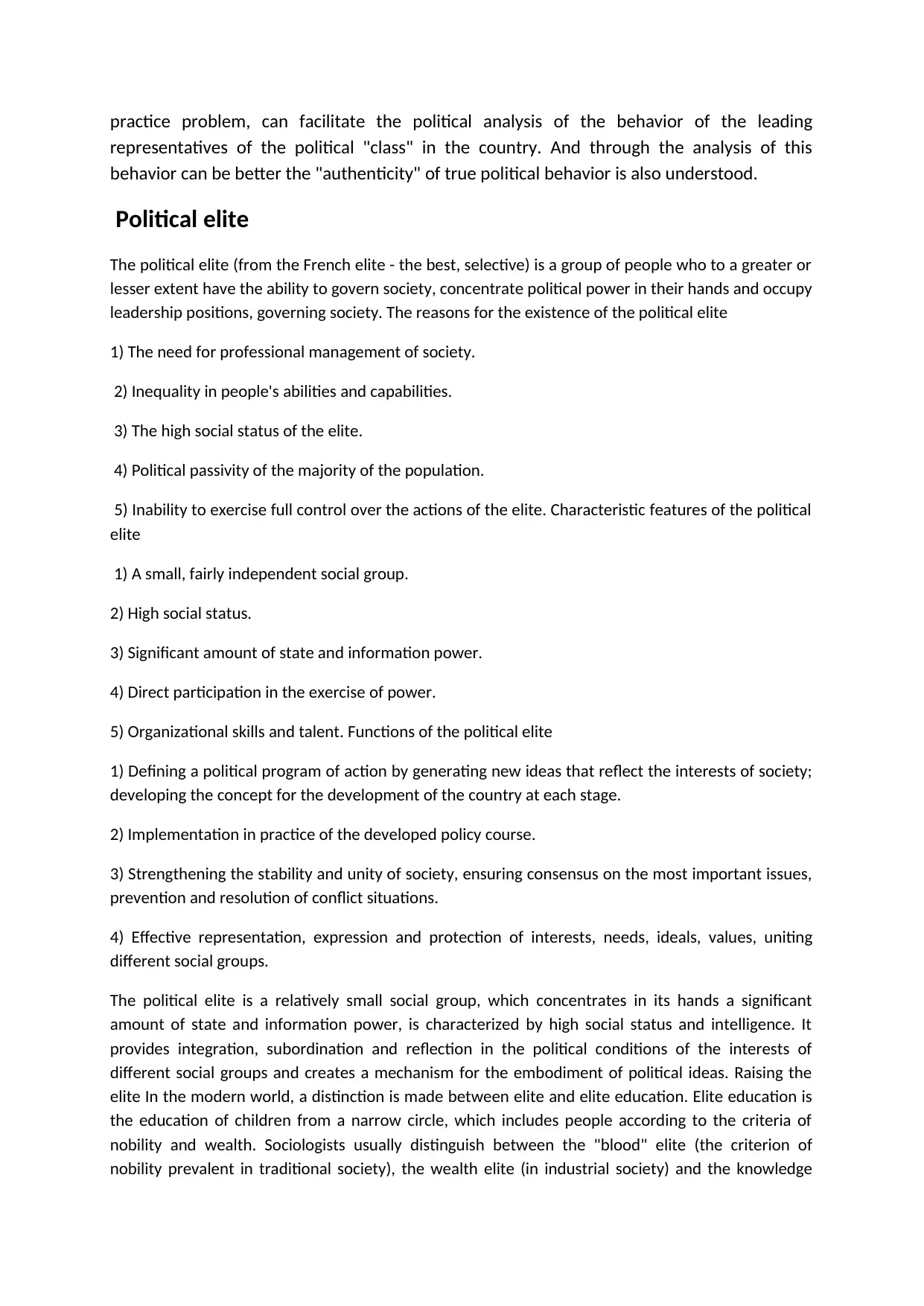
practice problem, can facilitate the political analysis of the behavior of the leading
representatives of the political "class" in the country. And through the analysis of this
behavior can be better the "authenticity" of true political behavior is also understood.
Political elite
The political elite (from the French elite - the best, selective) is a group of people who to a greater or
lesser extent have the ability to govern society, concentrate political power in their hands and occupy
leadership positions, governing society. The reasons for the existence of the political elite
1) The need for professional management of society.
2) Inequality in people's abilities and capabilities.
3) The high social status of the elite.
4) Political passivity of the majority of the population.
5) Inability to exercise full control over the actions of the elite. Characteristic features of the political
elite
1) A small, fairly independent social group.
2) High social status.
3) Significant amount of state and information power.
4) Direct participation in the exercise of power.
5) Organizational skills and talent. Functions of the political elite
1) Defining a political program of action by generating new ideas that reflect the interests of society;
developing the concept for the development of the country at each stage.
2) Implementation in practice of the developed policy course.
3) Strengthening the stability and unity of society, ensuring consensus on the most important issues,
prevention and resolution of conflict situations.
4) Effective representation, expression and protection of interests, needs, ideals, values, uniting
different social groups.
The political elite is a relatively small social group, which concentrates in its hands a significant
amount of state and information power, is characterized by high social status and intelligence. It
provides integration, subordination and reflection in the political conditions of the interests of
different social groups and creates a mechanism for the embodiment of political ideas. Raising the
elite In the modern world, a distinction is made between elite and elite education. Elite education is
the education of children from a narrow circle, which includes people according to the criteria of
nobility and wealth. Sociologists usually distinguish between the "blood" elite (the criterion of
nobility prevalent in traditional society), the wealth elite (in industrial society) and the knowledge
representatives of the political "class" in the country. And through the analysis of this
behavior can be better the "authenticity" of true political behavior is also understood.
Political elite
The political elite (from the French elite - the best, selective) is a group of people who to a greater or
lesser extent have the ability to govern society, concentrate political power in their hands and occupy
leadership positions, governing society. The reasons for the existence of the political elite
1) The need for professional management of society.
2) Inequality in people's abilities and capabilities.
3) The high social status of the elite.
4) Political passivity of the majority of the population.
5) Inability to exercise full control over the actions of the elite. Characteristic features of the political
elite
1) A small, fairly independent social group.
2) High social status.
3) Significant amount of state and information power.
4) Direct participation in the exercise of power.
5) Organizational skills and talent. Functions of the political elite
1) Defining a political program of action by generating new ideas that reflect the interests of society;
developing the concept for the development of the country at each stage.
2) Implementation in practice of the developed policy course.
3) Strengthening the stability and unity of society, ensuring consensus on the most important issues,
prevention and resolution of conflict situations.
4) Effective representation, expression and protection of interests, needs, ideals, values, uniting
different social groups.
The political elite is a relatively small social group, which concentrates in its hands a significant
amount of state and information power, is characterized by high social status and intelligence. It
provides integration, subordination and reflection in the political conditions of the interests of
different social groups and creates a mechanism for the embodiment of political ideas. Raising the
elite In the modern world, a distinction is made between elite and elite education. Elite education is
the education of children from a narrow circle, which includes people according to the criteria of
nobility and wealth. Sociologists usually distinguish between the "blood" elite (the criterion of
nobility prevalent in traditional society), the wealth elite (in industrial society) and the knowledge
⊘ This is a preview!⊘
Do you want full access?
Subscribe today to unlock all pages.

Trusted by 1+ million students worldwide
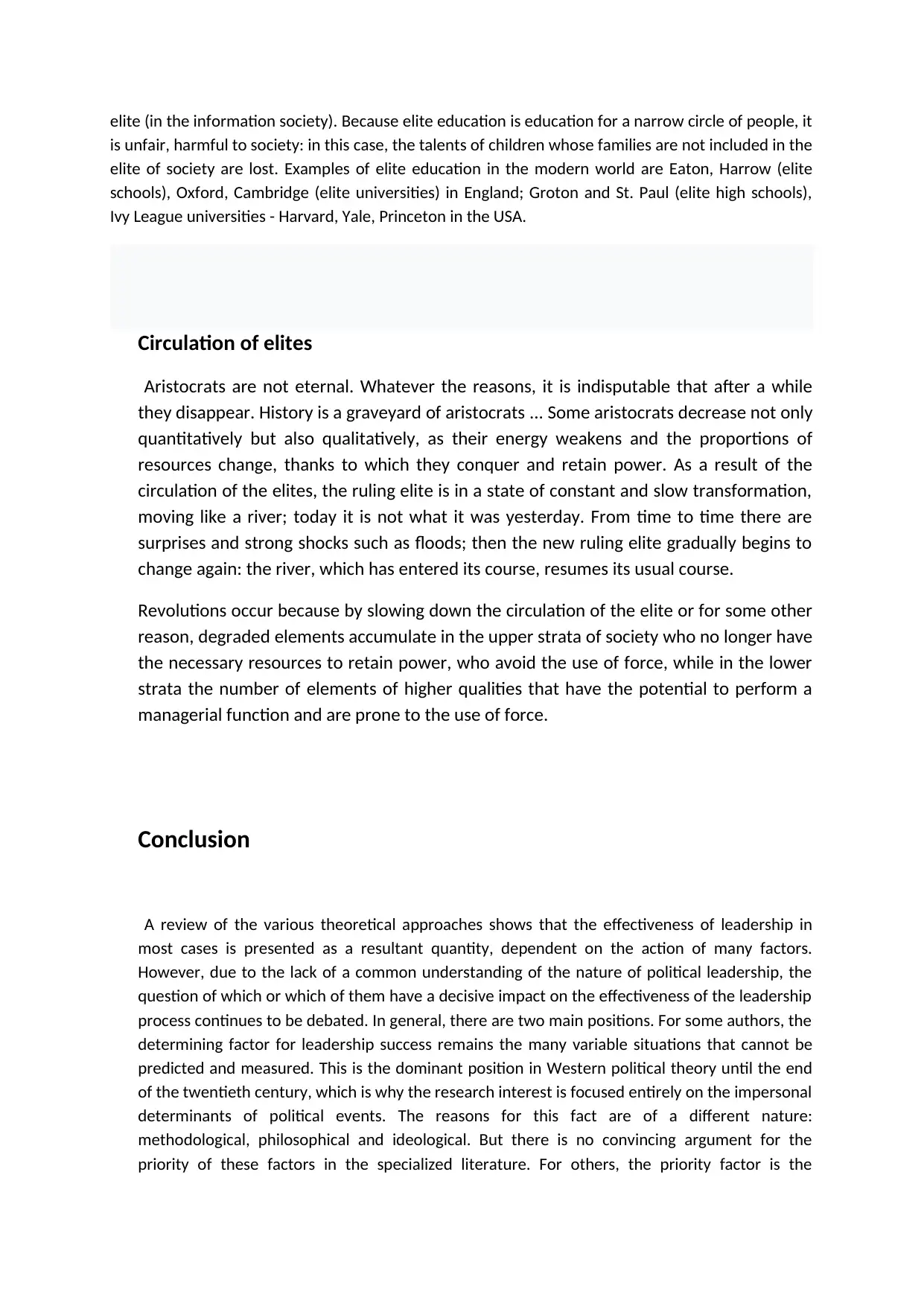
elite (in the information society). Because elite education is education for a narrow circle of people, it
is unfair, harmful to society: in this case, the talents of children whose families are not included in the
elite of society are lost. Examples of elite education in the modern world are Eaton, Harrow (elite
schools), Oxford, Cambridge (elite universities) in England; Groton and St. Paul (elite high schools),
Ivy League universities - Harvard, Yale, Princeton in the USA.
Circulation of elites
Aristocrats are not eternal. Whatever the reasons, it is indisputable that after a while
they disappear. History is a graveyard of aristocrats ... Some aristocrats decrease not only
quantitatively but also qualitatively, as their energy weakens and the proportions of
resources change, thanks to which they conquer and retain power. As a result of the
circulation of the elites, the ruling elite is in a state of constant and slow transformation,
moving like a river; today it is not what it was yesterday. From time to time there are
surprises and strong shocks such as floods; then the new ruling elite gradually begins to
change again: the river, which has entered its course, resumes its usual course.
Revolutions occur because by slowing down the circulation of the elite or for some other
reason, degraded elements accumulate in the upper strata of society who no longer have
the necessary resources to retain power, who avoid the use of force, while in the lower
strata the number of elements of higher qualities that have the potential to perform a
managerial function and are prone to the use of force.
Conclusion
A review of the various theoretical approaches shows that the effectiveness of leadership in
most cases is presented as a resultant quantity, dependent on the action of many factors.
However, due to the lack of a common understanding of the nature of political leadership, the
question of which or which of them have a decisive impact on the effectiveness of the leadership
process continues to be debated. In general, there are two main positions. For some authors, the
determining factor for leadership success remains the many variable situations that cannot be
predicted and measured. This is the dominant position in Western political theory until the end
of the twentieth century, which is why the research interest is focused entirely on the impersonal
determinants of political events. The reasons for this fact are of a different nature:
methodological, philosophical and ideological. But there is no convincing argument for the
priority of these factors in the specialized literature. For others, the priority factor is the
is unfair, harmful to society: in this case, the talents of children whose families are not included in the
elite of society are lost. Examples of elite education in the modern world are Eaton, Harrow (elite
schools), Oxford, Cambridge (elite universities) in England; Groton and St. Paul (elite high schools),
Ivy League universities - Harvard, Yale, Princeton in the USA.
Circulation of elites
Aristocrats are not eternal. Whatever the reasons, it is indisputable that after a while
they disappear. History is a graveyard of aristocrats ... Some aristocrats decrease not only
quantitatively but also qualitatively, as their energy weakens and the proportions of
resources change, thanks to which they conquer and retain power. As a result of the
circulation of the elites, the ruling elite is in a state of constant and slow transformation,
moving like a river; today it is not what it was yesterday. From time to time there are
surprises and strong shocks such as floods; then the new ruling elite gradually begins to
change again: the river, which has entered its course, resumes its usual course.
Revolutions occur because by slowing down the circulation of the elite or for some other
reason, degraded elements accumulate in the upper strata of society who no longer have
the necessary resources to retain power, who avoid the use of force, while in the lower
strata the number of elements of higher qualities that have the potential to perform a
managerial function and are prone to the use of force.
Conclusion
A review of the various theoretical approaches shows that the effectiveness of leadership in
most cases is presented as a resultant quantity, dependent on the action of many factors.
However, due to the lack of a common understanding of the nature of political leadership, the
question of which or which of them have a decisive impact on the effectiveness of the leadership
process continues to be debated. In general, there are two main positions. For some authors, the
determining factor for leadership success remains the many variable situations that cannot be
predicted and measured. This is the dominant position in Western political theory until the end
of the twentieth century, which is why the research interest is focused entirely on the impersonal
determinants of political events. The reasons for this fact are of a different nature:
methodological, philosophical and ideological. But there is no convincing argument for the
priority of these factors in the specialized literature. For others, the priority factor is the
Paraphrase This Document
Need a fresh take? Get an instant paraphrase of this document with our AI Paraphraser
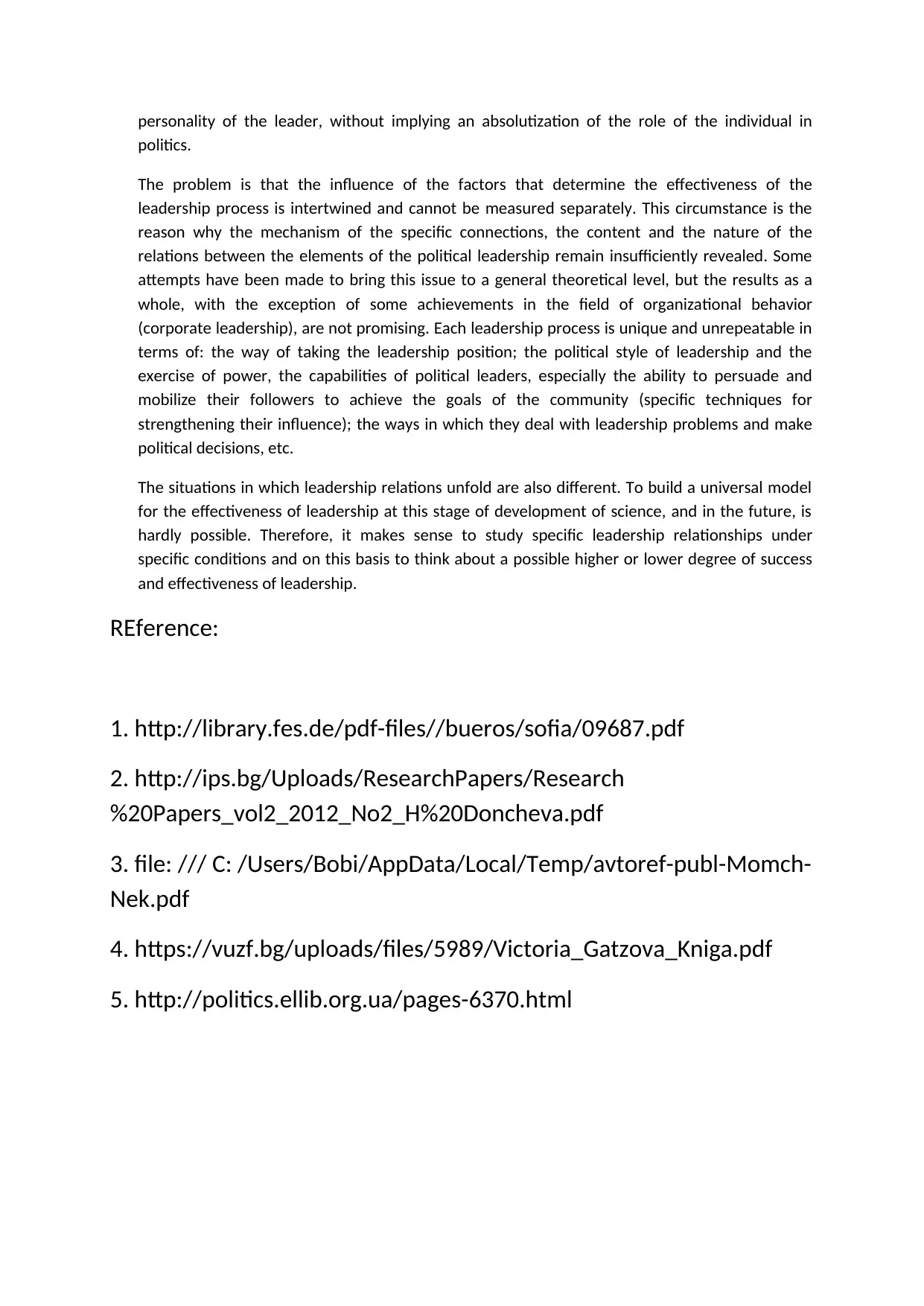
personality of the leader, without implying an absolutization of the role of the individual in
politics.
The problem is that the influence of the factors that determine the effectiveness of the
leadership process is intertwined and cannot be measured separately. This circumstance is the
reason why the mechanism of the specific connections, the content and the nature of the
relations between the elements of the political leadership remain insufficiently revealed. Some
attempts have been made to bring this issue to a general theoretical level, but the results as a
whole, with the exception of some achievements in the field of organizational behavior
(corporate leadership), are not promising. Each leadership process is unique and unrepeatable in
terms of: the way of taking the leadership position; the political style of leadership and the
exercise of power, the capabilities of political leaders, especially the ability to persuade and
mobilize their followers to achieve the goals of the community (specific techniques for
strengthening their influence); the ways in which they deal with leadership problems and make
political decisions, etc.
The situations in which leadership relations unfold are also different. To build a universal model
for the effectiveness of leadership at this stage of development of science, and in the future, is
hardly possible. Therefore, it makes sense to study specific leadership relationships under
specific conditions and on this basis to think about a possible higher or lower degree of success
and effectiveness of leadership.
REference:
1. http://library.fes.de/pdf-files//bueros/sofia/09687.pdf
2. http://ips.bg/Uploads/ResearchPapers/Research
%20Papers_vol2_2012_No2_H%20Doncheva.pdf
3. file: /// C: /Users/Bobi/AppData/Local/Temp/avtoref-publ-Momch-
Nek.pdf
4. https://vuzf.bg/uploads/files/5989/Victoria_Gatzova_Kniga.pdf
5. http://politics.ellib.org.ua/pages-6370.html
politics.
The problem is that the influence of the factors that determine the effectiveness of the
leadership process is intertwined and cannot be measured separately. This circumstance is the
reason why the mechanism of the specific connections, the content and the nature of the
relations between the elements of the political leadership remain insufficiently revealed. Some
attempts have been made to bring this issue to a general theoretical level, but the results as a
whole, with the exception of some achievements in the field of organizational behavior
(corporate leadership), are not promising. Each leadership process is unique and unrepeatable in
terms of: the way of taking the leadership position; the political style of leadership and the
exercise of power, the capabilities of political leaders, especially the ability to persuade and
mobilize their followers to achieve the goals of the community (specific techniques for
strengthening their influence); the ways in which they deal with leadership problems and make
political decisions, etc.
The situations in which leadership relations unfold are also different. To build a universal model
for the effectiveness of leadership at this stage of development of science, and in the future, is
hardly possible. Therefore, it makes sense to study specific leadership relationships under
specific conditions and on this basis to think about a possible higher or lower degree of success
and effectiveness of leadership.
REference:
1. http://library.fes.de/pdf-files//bueros/sofia/09687.pdf
2. http://ips.bg/Uploads/ResearchPapers/Research
%20Papers_vol2_2012_No2_H%20Doncheva.pdf
3. file: /// C: /Users/Bobi/AppData/Local/Temp/avtoref-publ-Momch-
Nek.pdf
4. https://vuzf.bg/uploads/files/5989/Victoria_Gatzova_Kniga.pdf
5. http://politics.ellib.org.ua/pages-6370.html
1 out of 8
Related Documents
Your All-in-One AI-Powered Toolkit for Academic Success.
+13062052269
info@desklib.com
Available 24*7 on WhatsApp / Email
![[object Object]](/_next/static/media/star-bottom.7253800d.svg)
Unlock your academic potential
Copyright © 2020–2026 A2Z Services. All Rights Reserved. Developed and managed by ZUCOL.



